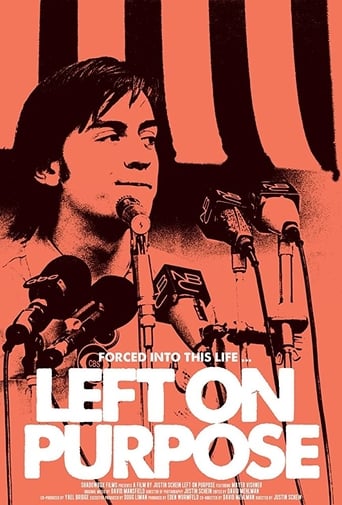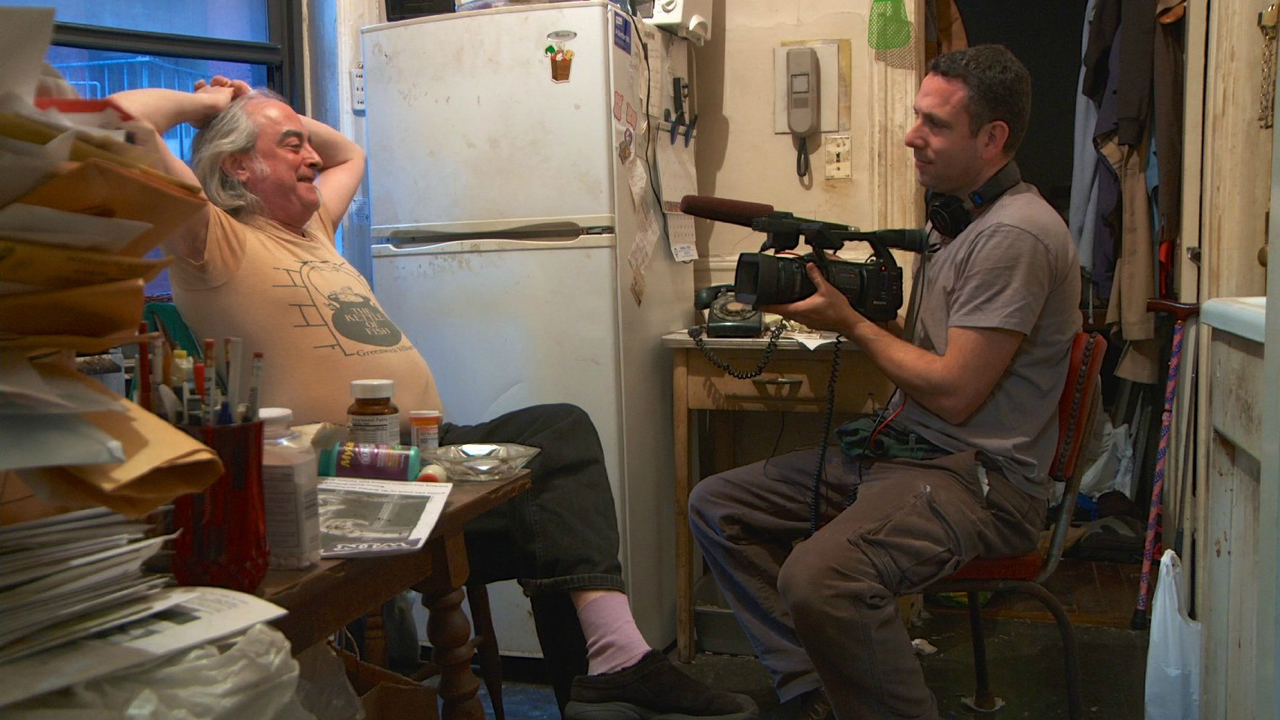stickler-2
Left On Purpose is a heart-wrenching study of a man and the choices he makes. Over the progression of the sometimes surprisingly amusing subject the film also becomes a study of the choices a documentary filmmaker must at times make in order to see a project through and what happens when the filmmaker becomes personally intertwined with the subject. Highly recommended as a study of the complexities inherent in the human condition.
David Ferguson
Greetings again from the darkness. A film about a guy with an aversion to wearing pants would not typically hold much appeal for me, but this is no typical documentary and Mayer Vishner is no typical subject. Co-directors Justin Schein and David Mehlman raise a couple of philosophical questions here: should a person have the right to take their own life, and what responsibility does a documentarian have towards their subject when faced with an ethical dilemma?Very few younger than 50 (maybe even 60) will recognize the name Mayer Vishner. He worked closely with those who founded the radical 1960's group called the Yippies (Youth International Party) – Abbie Hoffman, Paul Krassner, Jerry Rubin (also an early Apple investor and stockbroker), and musician Phil Ochs. A self-described Forrest Gump, Mayer states he helped them be "giants". The Yippies challenged authority and the system at every turn and were quite proud to create the label counter-culture.Five decades later, Mayer remains holed up in his same Greenwich Village apartment not far from MacDougal St and the Gaslight Café, where much of the Yippies action took place. The small apartment is in total disarray and Mayer now lives in squalor, getting through most days with absurd amounts of alcohol and pot, and apparently very little human interaction outside of director Schein's visits.It's here where things get fuzzy. Schein set out to make a film about a man who was right in the middle of one of the most tumultuous times in US history, but seemed to make the ultimate documentarian mistake of becoming too close
even friends
with his subject. It's this line-crossing that puts Schein in the cross-hairs of a moral dilemma when Mayer states, "If this film happens, it will be about a film about suicide". Should he keep filming? Should he get help for Mayer? Should he walk away from the project and let nature take its course? What follows is an up close and personal look at a man who is still very articulate, though suffering bouts of depression due to a life of loneliness and solitude. He sees no reason why he shouldn't be able to end his life on his own terms and in front of a camera. We also see Mayer's periodic surges of energy
whether it's the Occupy Wall Street movement (I've "been here before"), seeing his brothers, or a visit with Diane, his friend of 35 years who helps with therapeutic gardening. Of course, these surges are short-lived and each followed by a hard crash.Along the way, we see a video clip of 16 year old Mayer just beginning his lifelong journey of questioning authority. We also see the 3 pallets of memories being stored in a warehouse prior to being purchased by the University of Michigan, and we learn that Mayer was once the editor of "LA Weekly", though fired for his alcoholism.Mayer's own notes describe himself as an anarchist, pacifist, gardener, poet and dozens more. He clearly had a purpose in life and ultimately, in death. The film is tough to watch at times both because of Mayer's self-destructive mode, and for the interesting and debatable issues raised by continuing with filming. Perhaps the film will have you questioning your own beliefs, though the hope is you never find yourself in this situation with a friend. A well made documentary should educate and inspire discussion, and there's no shortage of either with this one.
Terrance Swords
The story of the Yippies is full of compelling and amusing characters, and someone will eventually make an entertaining film just revisiting the hi-jinks and hilarity, cutting away before the bummers start piling up. If wreckage is more to your taste, there's a film to be made of that as well.Left on Purpose isn't either film. It passes that low-hanging fruit for who-knows-what. Initially, it feels familiar, as Mayer reminisces about his youth and the Yippies in their heyday. Mayer is a character far, far removed from his glory days, and it's a bit perplexing at first when the film returns to his glamourless life and very uncertain future instead of lingering in his colorful past.The most compelling documentaries are those in which neither filmmaker, subject, not viewer knows where things are headed. That appears to have created a stressful situation for Schein, as Mayer maneuvers first for control of the film and then for control of the filmmaker. The partnership between the two makes for the great drama of the film. Schein clearly did not set out to make a film about a filmmaker's dilemma, and his discomfort is obvious. It was a stroke of freaking genius and a bold-ass move for Schein to let the film follow the story where it led instead of where he had planned.
lsmarand
I saw the movie two days ago and thought about it for a while. It felt really dragging and depressing. I would say one of the most depressing movies I have ever seen. And it it was not at all necessary. I think the director set to make a movie about an icon of the peace movement in NY and he found a depressed man with a lot of stories. Instead of rising to the occasion and asking questions that would have revealed a really amazing life story and many amazing life stories intertwined with the Mayor's, who was at some point a catalyst for an entire generation, the director became interested instead in the minutia of a depressed old man's life and decided that his role was to deconstruct a hero and and a peace movement symbol. It is sickening and it felt like the director took pleasure in recording long hours of an old man's sad lonely life (who believed the film maker was interested in his story)- and sad and lonely life for good reasons, because the freedom he fought for is nowhere to be seen..There is about a half hour of the movie when this man is shown in his underwear, and the camera lingers on that side of his body for an awkward amount of time..It was cruel and mean to show a man who has done amazing things in his life with such cold detail. If someone was to set a camera on a homeless man's every day life minute to minute and focus on all the ugly and stinky details of poverty, depression and old age combined, that would describe well the atmosphere of the movie. It is a disgusting attempt to get attention by exposing a cultural icon and degrading them while still alive. I don't understand why the family and friends consented and allowed this film. It felt cold and mean and judgmental.The director failed to tell an interesting life story, and he was one of the last people to talk to and get close to this man, This movie could have been great, with another director. This guy did not know what he was looking for , or how to make a movie. It seems that he patched together materials he could get easy access to, and glossed over the interesting past because he only had photography and couldn't figure an interesting way to convey the story. Plus he had a baby, so the final product may have been his decision to wrap up the movie quickly with the material he already had.Watch this if you want to learn how not to make a documentary.


 AD
AD
